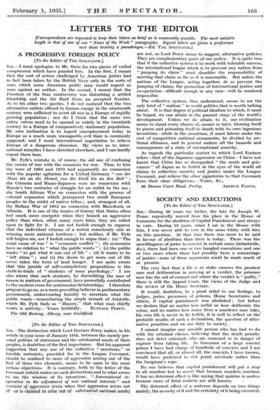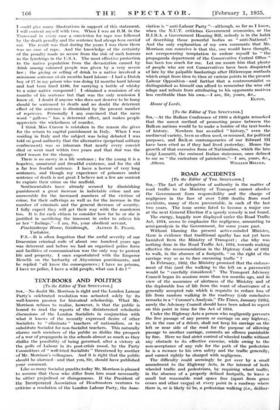SOCIETY AND EXECUTIONS
[To the Editor of THE SPECTATOR.] SIR,—During 38 years my father, the late Sir Joseph W.. Pease, repeatedly moved from his place in the House of Commons for the abolition of Capital Punishment and always in vain. During 18 years, when I sat in the House with him, I= was never able to vote in the same lobby with him on this question. At that time there was more to be said in favour of abolition- than there is today. There was the unwillingness of juries to convict in certain cases (infanticide, &c.), there' had- been one or two bungled executions and one or two cases where there had possibly been a miscarriage of justice—none of these arguments could be made much of at present.
The very fact that a life is at stake ensures the greatest care and deliberation in . arriving at a verdict, the prisoner now has the aid of counsel and where the verdict is " guilty," there is still the Appeal Court, the views of the Judge and the review of the Home Secretary. , •
It would, doubtless, be a great relief to our feelings, to judges, juries, -governors of prisons, Home Secretaries and
others, if capital punishment was abolished ; but before • we declare that no matter how awful or how deliberate the crime, and no matter how many lives a murderer may take, his own life is never to be forfeit, it is well to reflect on the probable results of such a declaration, the question of alter- native penalties and on our duty to society.
I cannot imagine any sensible person who has had to do with the criminal classes, believing . that the death penalty does not deter criminals who are cornered or in danger of capture from taking life. As Governor of a large convict prison I have had charge of hundreds of convicts and I am convinced that all,. or almost all, the convicts I have known, would have preferred to risk penal servitude rather than the hangman's. rope.
No . one believes that capital punishment will put a stop to all murders but to assert that because murders continue it, has no deterrent effect is like, saying that quinine is useless because cases of fatal malaria are still known.
The deterrent effect of a sentence depends on two things mainly, the severity of it and the certainty of it being executed.
I could give many illustrations in support of this statement. I will content myself with two. When I was an R.M. in the Transvaal in every case a conviction for rape was followed by the death penalty and the sentence had always been carried out. The result was that during the years I was there there was no case of rape. And the knowledge of the certainty of the penalty made us secure from the risk of such horrors as the lynchings in the U.S.A. The most effective protection- to the native population from the devastation caused by drink among coloured people was given by a very severe law ; the giving or selling of drink to a native involved a minimum sentence of. six months hard labour—I had a Dutch boy of 17 in my prison who was doing 12 months hard labour and had been fined £100, for carrying a bottle of whisky to a mine native compound ! I obtained a remission of six months of his sentence but that was the only remission I know of. I doubt if anyone who does not deserve to be hung should be sentenced to death and no doubt the deterrent effect of. the sentence is diminished by the present number of reprieves. Personally I am, convinced that the mere word . gallows " has a deterrent effect, and makes people appreciate the wickedness of murder.
I think Miss Craven is mistaken in the reason she gives for the return to capital punishment in Italy. When I was residing in Italy and the subject was being debated I was told on good authority that the alternative (perpetual solitary confinement) was so inhuman that nearly every convict died or went mad within two years and that that was the chief reason for the change.
There is no mercy in a life sentence ; for the young it is a hopeless, unnatural and dreadful existence, and for the old a far less fearful sentence. I have a horror of very long Sentences, and though my experience of prisoners under sentence of death is not great I believe not a few are content to expiate their crime on the scaffold.
Sentimentalists have already secured by diminishing punishment a great increase in indictable crime and are answerable for the increased numbers of the victims of crime, for their sufferings as well as for the increase in the number of criminals and the general decrease of security. I fully expect they will get their way with the murderers too. It is for each citizen to consider how far he or she is justified in sacrificing the innocent in order to relieve his or her feelings."—I am, Sir, your obedient servant,
Pinchinthorpe House, Guisbrough, ALFRED E. PEASE. Yorkshire.
P.S.—It is often forgotten that the awful severity of our Draconian criminal code of about one hundred years ago was deterrent and before we had an organized police force and facilities of communication was the only way to protect life and property. I once expostulated with the Emperor Menelik on the barbarity of Abyssinian punishments, and he replied " all know the consequences ; I have no prisons, I have no police, I have a wild people, what can I do ? "















































 Previous page
Previous page